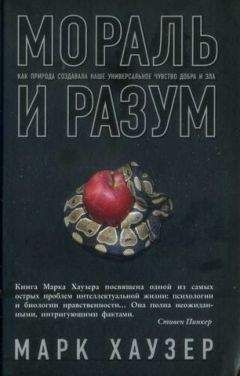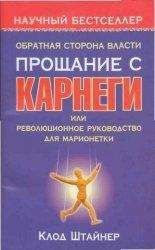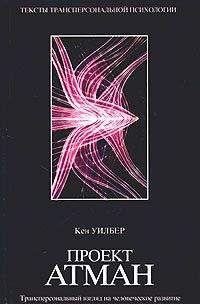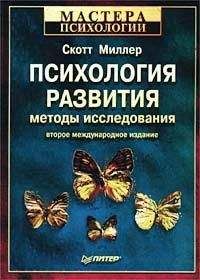Марк Хаузер - Мораль и разум. Как природа создавала наше универсальное чувство добра и зла

Скачивание начинается... Если скачивание не началось автоматически, пожалуйста нажмите на эту ссылку.
Жалоба
Напишите нам, и мы в срочном порядке примем меры.
Описание книги "Мораль и разум. Как природа создавала наше универсальное чувство добра и зла"
Описание и краткое содержание "Мораль и разум. Как природа создавала наше универсальное чувство добра и зла" читать бесплатно онлайн.
В книге известного американского ученого Марка Хаузера утверждается, что люди обладают врожденным моральным инстинктом, действующим независимо от их пола, образования и вероисповедания. Благодаря этому инстинкту, они могут быстро и неосознанно выносить суждения о добре и зле. Доказывая эту мысль, автор привлекает многочисленные материалы философии, лингвистики, психологии, экономики, социальной антропологии и приматологии, дает подробное объяснение природы человеческой морали, ее единства и источников вариативности, прослеживает пути ее развития и возможной эволюции. Книга имела большой научный и общественный резонанс в США и других странах. Перевод с английского Т. М. Марютиной Научный редактор перевода Ю. И. Александров
Newtson D., Engquist G. & Bois J. (1977). The objective basis of behavior units // Journal of Personality and Social Psychology, 35, 847—862.
Newtson D., Hairfield Bloomingdale J. & Cutino S. (1987). The strucutre of action and interaction // Social Cognition, 5, 191—237.
Nichols S. (2002). Norms with feeling: toward a psychological account of moral judgment // Cognition, 84, 221—236.
Nichols S. (2004). Sentimental Rules. New York: Oxford University Press.
Nichols S. & Folds-Bennett T (2003). Are children moral objectivists? Children’s judgments about moral and response-dependent properties // Cognition, B23— B32.
Nikulina E. M. (1991). Neural control of predatory aggression in wild and domesticated animals // Neuroscience and Biobehavioral Reviews, 15, 545—547.
Nisbett R. E. & Cohen D. (1996). Culture of Honor: The Psychology of Violence in the South. Boulder, CO: Westview Press.
Noe R. (1990). A veto game played by baboons: a challenge to the use of the Prisoner’s Dilemma as a paradigm of reciprocity and cooperation // Animal Behaviour, 39, 78—90.
Noe R., van Hoof J. A. R. A. M. & Hammerstein P (2001). Economics in Nature. Cambridge: Cambridge University Press.
Nourse V. (1997). Passion’s progress: modern law reform and the provocation defense // Yale Law Journal, 106, 1331—1344.
Nowak М. A., Page К. М. & Sigmund К. (2000). Fairness versus reason in the ultimatum game // Science, 289, 1773—1775.
Nowak M. A. & Sigmund K. (2000). Enhanced: Shrewd investments // Science, 288, 819.
Nucci L. (2001). Education in the Moral Domain. Cambridge: Cambridge University Press.
Nunez M. & Harris P L. (1998). Psychological and deontic concepts: separate domains or intimate connection? // Mind and Language, 13, 153—170.
Nusshaum M. (2004). Hiding from Humanity: Disgust, Shame, and the Law. Princeton, NJ: Princeton University Press.
O'Neill P & Petrinovich L. (1998). A preliminary cross cultural study of moral intuitions // Evolution and Human Behavior, 19, 349—367.
Ohman A., Flykt A. & Esteves F (2001). Emotion drives attention: Detecting the snake in the grass // Journal of Experimental Psychology: General, 130, 466— 478.
Oliveira Souza R. & Moll J. (2000). The moral brain: a functional MRI study of moral judgment // Neurology, 54, 1331—1336.
Olson J. M., Roese N. J. & Zanna M. P (1996). Expectancies // E. T. Higgins & A. W Kruglanski (Eds.), Social Psychology: Handbook of Basic Principles (p. 211—238). New York: Guilford Press.
Olsson A., Ebert J. P, Banaji M. R. & Phelps E. A. (2005). The role of social groups in the persistence of learned fear // Science, 309, 711—713.
Onishi К. H. & Baillargeon R. (2005). Do 15-month-old infants understand false beliefs? // Science, 308, 255—257.
Packer C. (1977). Reciprocal altruism in olive baboons // Nature, 265, 441—443.
Packer C. & Pusey A. (1985). Asymmetric contests in social mammals: respect, manipulation and age-specific aspects // P J. Greenwood & P H. Harvey (Eds.), Evolution: Essays in Honour of John Maynard Smith (p. 173—186). Cambridge: Cambridge University Press.
Packer C. & Ruttan L. (1988). The evolution of cooperative hunting // American Naturalist, 132, 159—198.
Paladino M.-P, Leyens J.-P, Rodriguez R., Rodriguez A., Gaunt R. & Demoulin S. (2002). Differential association of uniquely and non-uniquely human emotions with the ingroup and outgroup // Group Processes and Intergroup Relations, 5, 105—117.
Parr L. A. (2001). Cognitive and psychological markers of emotional awareness in chimpanzees // Animal Cognition, 4, 223—229.
Patterson O. (1982). Slavery and Social Death. Cambridge, MA: Harvard University Press.
Peake P K., Mischel W. & Hebl M. (2002). Strategic attention deployment for delay of gratification in working and waiting situations // Developmental Psychology, 38(2), 313—326.
Peterson L., Hartmann D. P & Gelfand D. M. (1977). Developmental changes in the effects of dependency and reciprocity cues on children’s moral judgments and donation rates // Child Development, 48,1331—1339.
Petrinovich L. & O'Neill P (1996). Influence of wording and framing effects on moral intuitions // Ethology and Sociobiology, 17, 145—171.
Petrinovich L.y O'Neill P & Jorgensen M. J. (1993). An empirical study of moral intuitions: towards an evolutionary ethics // Ethology and Sociobiology, 64, 467— 478.
Phelps E. A.y O'Connor K. Cunningham W. A., Funayama S.y Gatenby J. C, Gore J. C. & Banaji M. R. (2000). Performance on indirect measures of race evaluation predicts amygdala activation // Journal of Cognitive Neuroscience, 72, 729—738.
Piaget J. (1932/1965). The Moral Judgment of the Child. New York: Free Press.
Piaget J. (1954). The Construction of Reality in the Child. New York: Basic Books.
Pica Py Lemer C, Izard V & Dehaene S. (2004). Exact and approximate arithmetic in an Amazonian Indigene Group // Science, 306y 499—503.
Pinker S. (1994). The Language Instinct. New York: William Morrow and Company.
Pinker S. (1997). How the Mind Works. New York: Norton.
Pinker S. (2002). The Blank Slate. New York: Penguin.
Pinker S. & Jackendoff R. (2005). The faculty of language: what’s special about it? // Cognition, 95, 201—236.
Platek S. M.y Critton S. R.y Myers T E. & Gallup G. G.,/r. (2003). Contagious yawning: the role of self-awareness and mental state attribution // Cognitive Brain Research, 17у 223—227.
Polak A. & Harris P L. (1999). Deception by young children following noncompliance // Developmental Psychology, 35, 561—568.
Posner E. A. (2000). Law and Social Norms. Cambridge, MA: Harvard University Press.
Posner R. A. (1992). Sex and Reason. Cambridge, MA: Harvard University Press.
Posner R. A. (1998). The problematics of moral and legal theory // Harvard Law Review, Illy 1637—1717.
Povinelli D. (2000). Folk Physics for Apes. New York: Oxford University Press.
Povinelli D. J. & Eddy T. J. (1996). What young chimpanzees know about seeing // Monographs of the Society for Research in Child Development, 1—247.
Povinelli D. J.yRulfA. B., Landau K. R. & Bierschwale D. T. (1993). Self-recognition in chimpanzees (Pan troglodytes): Distribution, ontogeny, and patterns of emergence // Journal of Comparative Psychology, 107, 347—372.
Premack D. (1976). Intelligence in Ape and Man. Hillsdale, NJ: Lawrence Erlbaum Associates.
Premack D. (1990). The infant’s theory of self-propelled objects // Cognition, 36, 1—16.
Premack D. & Premack A. (1983). The Mind of an Ape. New York: Norton.
Premack D. & Premack A. (2002). Original Intelligence. New York: McGraw Hill.
Premack D. & Premack A. J. (1995). Origins of human social competence // M. Gazzaniga (Ed.), The Cognitive Neurosciences (p. 205—218). Cambridge, MA: MIT Press.
Premack D. & Premack A. J. (1997). Infants attribute value+/to the goal-directed actions of self-propelled objects // Journal of Cognitive Neuroscience, 9, 848— 856.
Preston S. & de Waal E В. M. (2002). Empathy: It’s ultimate and proximate bases // Behavioral and Brain Sciences, 25, 1—72.
Preuschoft S. (1999). Are primates behaviorists? formal dominance, cognition and free-floating rationales // Journal of Comparative Psychology, //3, 91—95.
Prinz J.J. (2004). Gut Reactions. New York: Oxford University Press.
Prinz J. J. (in press). Against moral nativism // P Carruthers & S. Laurence & S. Stich (Eds.), Innateness and the Structure of the Mind, Vol. II. Oxford: Oxford University Press.
Pylyshyn Z. W & Storm R. W. (1998). Tracking multiple independent targets: Evidence for a parallel tracking mechanism // Spatial Vision, 3, 179—197.
Rachels J. (1975). Active and passive euthanasia // New England Journal of Medicine, 292, 78—80.
Rachels J. (2000). Naturalism // H. LaFollette (Ed.), The Blackwell Guide to Ethical Theory (p. 74—91). Maiden, NJ: Blackwell Publishing.
Rachels J. (2003). The Elements of Moral Philosophy. Boston: McGraw Hill.
Rachlin H. (2000). The Science of Self-Control. Cambridge, MA: Harvard University Press.
RaineA.y Ishikawa S. S., Arce £., Lencz Г., Knuth K. //., Bihrle S., LaCasse L. & Colletti P (2004). Hippocampal structural asymmetry in unsuccessful psychopaths // Biological Psychiatry, 55, 185—191.
Rakison D, H. & Poulin-Duhois D. (2001). Developmental origins of the animateinanimate distinction // Psychological Bulletin, /27, 209—228.
Ratnieks E L. W. & Visscher P K. (1989). Worker policing in the honeybee 11 Nature, 342, 796—797.
Ratnieks F L. W. & Wenseleers T (2005). Policing insect societies // Science, 7, 54— 56.
Rawls J. (1950). A study in the grounds of ethical knowledge: Considered with reference to judgments on the moral worth of character. Unpublished Ph. D., Princeton University, Princeton, NJ.
Rawls J. (1971). A Theory of Justice. Cambridge, MA: Harvard University Press.
Rawls J. (2001). Justice as Fairness. Cambridge, MA: Belknap, Harvard University Press.
Reynolds B. & Schiffhauer R. (2004). Measuring state changes in human delay discounting: an experimental discounting task // Behavioural Processes, 67, 343— 356.
Richerson P J. & Boyd R. (2005). Not by Genes Alone: How culture transformed human evolution. Chicago: University of Chicago Press.
Ridley M. (1996). The Origins of Virtue. New York: Viking Press/Penguin Books.
Riling J., Gutman Z)., Zeh Г, Pagnoni G., Berns G. & Kilts C. (2002). A neural basis for social cooperation // Neuron, 35, 395—405.
Ristau C. (1991). Aspects of the cognitive ethlogy of an injury-feigning bird, the piping plover // C. Ristau (Ed.), Cognitive ethobgy: the minds of other animals (p. 91—126). Hillsdale, NJ: Erlbaum.
Rizzolatti G., Fadiga L., Fogassi L. & Gallese V (1999). Resonance behaviors and mirror neurons // Archives Italiennes de Biologie, /37, 83—99.
Rizzolatti G., Fadiga L., Matelli M., Bettinardi V, Perani D. & Fazio F. (1996). Localization of grasp representation in humans by positron emission tomography: 1. Observation versus execution // Experimental Brain Research, ///, 246—252.
Rochat P & Striano T (1999). Emerging self-exploration by 2-month-old infants // Developmental Science, 2, 206—218.
Rogers A. R. (1994). Evolution of time preference by natural selection // American Economics Review, 84, 460—481.
Rogers A. R. (1997). The evolutionary theory of time preference // G. Bock & G. Cardew (Eds.), Characterizing Human Psychological Adapatations (p. 231— 252). London: Wiley.
Rolls E. T (1999). Brain and Emotion. Oxford: Oxford University Press.
Rorty R. (1998). Truth and Progress: Philosophical Papers, Volume 3. Cambridge: Cambridge University Press.
RosatiA. (2005). Discounting in tamarins and marmosets. Unpublished Undergraduate Honors Thesis, Harvard University, Cambridge, MA.
Roskies A. (2003). Are ethical judgments intrinsically motivational? Lessons from “acquired sociopathy” // Philosophical Psychology, 16, 51—66.
Rozin P. (1997). Moralization // A. Brandt & P Rozin (Eds.), Morality and Health (p. 379—401). New York: Routledge.
Rozin P & Fallon A. E. (1987). A perspective on disgust // Psychological Review, 94, 23—41.
Rozin P, Haidt J. & McCauley C. R. (2000). Disgust // M. Lewis & J. M. HavilandJones (Eds.), Handbook of Emotions, 2nd Edition (p. 637—653). New York: Guilford Press.
Подписывайтесь на наши страницы в социальных сетях.
Будьте в курсе последних книжных новинок, комментируйте, обсуждайте. Мы ждём Вас!
Похожие книги на "Мораль и разум. Как природа создавала наше универсальное чувство добра и зла"
Книги похожие на "Мораль и разум. Как природа создавала наше универсальное чувство добра и зла" читать онлайн или скачать бесплатно полные версии.
Мы рекомендуем Вам зарегистрироваться либо войти на сайт под своим именем.
Отзывы о "Марк Хаузер - Мораль и разум. Как природа создавала наше универсальное чувство добра и зла"
Отзывы читателей о книге "Мораль и разум. Как природа создавала наше универсальное чувство добра и зла", комментарии и мнения людей о произведении.

























